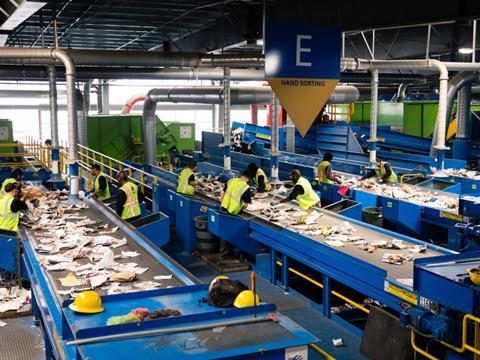
The Recycling Partnership has announced a $4.25 million grant to FCC Environmental Services’ materials recovery facility (MRF) in Houston, Texas, to improve its ability to recycle film and flexible packaging (FFP), supported by PepsiCo, Kraft Heinz, and the Film and Flexibles Recycling Coalition.
Through this grant, FCC Environmental Services will retrofit its Houston MRF with advanced technology to improve the recovery of plastic film. In partnership with its suppliers, FCC says it has designed a system intended to meet market specifications and recover plastic film at high levels of purity from a single material stream.
The upgrades will include TOMRA optical sorters to distinguish film from paper and other materials, along with additional conveyors to enhance processing and efficiency.
The Partnership states that FFP such as plastic bags, pouches and wraps makes up 34% of the total U.S. plastics packaging industry, but has an ‘incredibly low’ annual recycling rate. It says this is largely due to the complexities of recycling FFP due to disruptions in recycling equipment and contamination of other recyclable commodities such as paper, high processing costs, and limited end-market demand, which have led to reluctance by both communities and processors to accept FFP in their local programs and facilities.
According to The Recycling Partnership, investments to build recycling infrastructure for FFP are critical as Extended Producer Responsibility (EPR) legislation has been passed in seven states including California, whose requirements will impact packaging supply chains nationwide.
In related news, Closed Loop Partners has published new data - retrieved through utilizing AI-powered vision systems - which reveals high volumes of recycled food-grade polypropylene (PP) has been captured at materials recovery facilities (MRFs). AI-powered vision systems were used to characterize the PP recycling stream, filling data gaps on the availability of food-grade PP and potentially creating new opportunities to return the material to foodservice packaging supply chains.
One of Europe’s ‘busiest’ Materials Recycling Facilities (MRFs) has reportedly tracked and traced 100% of the single-use plastic bottles it recycles as Citeo adopts Polytag’s UV tagging solution. Polytag’s technology uses food-safe fluorescent ink to apply invisible, GS1-standard QR codes directly to packaging labels, said to be compatible with standard printing methods like digital, flexographic solvent-based, and UV-cure inks.
If you liked this story, you might also enjoy:
The ultimate guide to the Packaging and Packaging Waste Regulation in 2025
How are the top brands progressing on packaging sustainability?
Everything you need to know about global packaging sustainability regulation in 2025
The key to increasing the use of reusable packaging in supermarkets














No comments yet